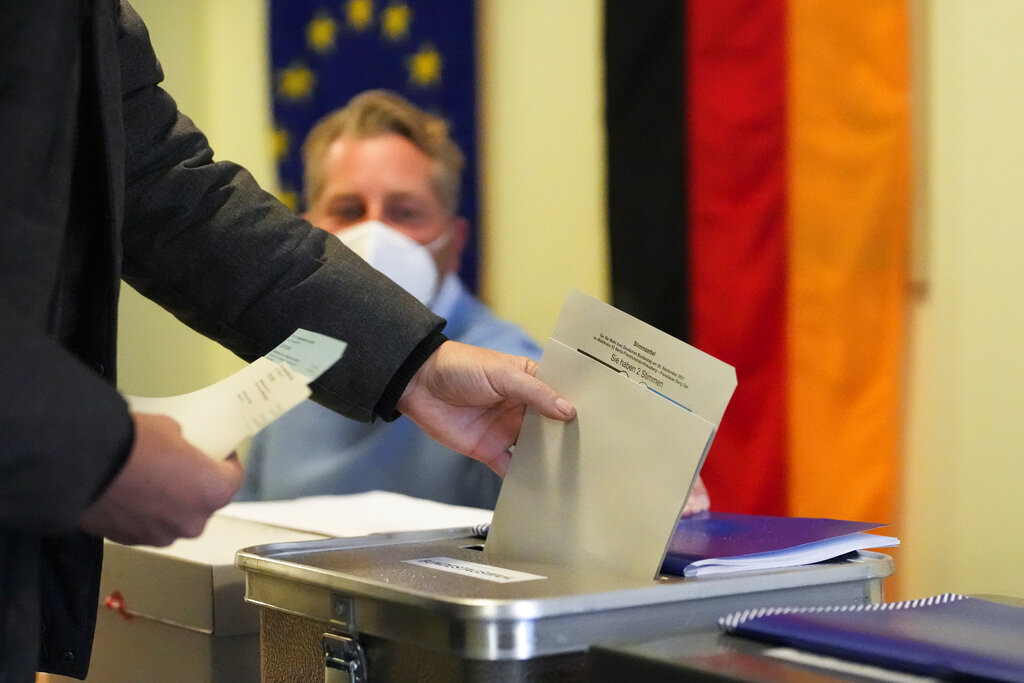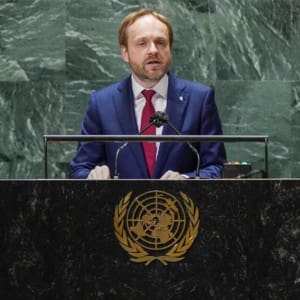Germany has chosen. Although the election is on the verge of being decided, we already know the outcome. There’s an English acronym for this situation that could even be a female nickname, TINA, but it’s actually an acronym that stands for “There Is No Alternative.”
Well, there is no alternative for Germany either, so the German voter is free to choose between much of the same — as free citizens are allowed to. This is the case, and even more so if we know that there is a party that has chosen its name in a very professional way, this is the Alternative for Germany (AfD), which — at least in name — offers an alternative to Germans.
But the AfD, on the one hand, is a quarantined, stigmatized party and, whatever the outcome, is not a force ready to govern. On the other hand, the party’s rather eclectic, incoherent program is not a true alternative to the country’s more accepted parties.
It also seems certain that not only will there not be a single party that can gain an absolute majority, but there will certainly be no result where a coalition of two parties could have a majority. At least three or even four parties will be needed to form a government. The Great Right (CDU-CSU) and the Left (SPD) are equally at historic lows, largely due to their dissolution into the trendy multicultural swamp. Meanwhile, the Green Party and Die Linke have been embedded as generators of multicultural chaos. Everything shows signs of disintegration, without chance or hope for a solution.
In a demographic sense, Germany is essentially dead, unable and unwilling to change its trajectory towards demise.
The question rightly arises as to how Europe’s leading power got to this point? Although we have already dealt with it, it is worth re-summarizing this point. Germanism was the main pedestal of the dominant power of Europe and early Christianity, the Holy Roman Empire. But the most important obstacle to the “non-existent” force that was supposed to build the modern West was precisely this construction that can still preserve sacrality.
Therefore, after long preparations, preceded by the Reformation, which tragically shattered the Holy Roman Empire against its original goals, it triggered the Thirty Years’ War, which was the most devastating war in European history. Here, the sacred historical German nation was destroyed. This was followed by two centuries of ‘punishment,’ when the Dutch, the French and then the British become a world empire for a century, while for Germany, it remains taboo.
After two centuries, as a tightly controlled nation-state, the second German empire, which becomes the most dynamic and powerful industrial power in the world, surpassed even the British Empire, destroyed the French power structure in a lightning war, and felt its moment has finally come, that for a hundred years it too could become a world empire, but as it turns out, it was a fatal mistake because we already had a new candidate, the United States of America.
And since the Second German Empire did not understand the fine print, it was brutally crushed in the first phase of another Thirty Years’ War called World War I. But they were so cruelly plundered financially and humiliated spiritually that they almost provoked the rebellion that came in the form of the Third Reich.
The “non-existent” world power built itself up, financed, and led Germany against the Soviet Union, hoping that the war will bring it huge benefits, and both sides will weaken enough to be kept under control. But the game takes a much more brutal turn, Hitler turns against those who move him as a puppet, and this leads to the destruction of the Third Reich in the second phase of the Thirty Years’ War.
And this allows the lords of the world to make an irresistible offer to create a “fourth German empire.” It is allowed to get rich on its own, but there is no past, no history, no culture, instead, there is a multicultural scourge that consumes almost everything in three generations. But in the seventies and eighties, the new generation hopes that perhaps the punishment may be over, since they are already retirees — even though they have played a role in the war.
But the immediate response is a civil war with the Red Army Faction. Since then, the obedient Fifth Empire has been built, where, once the Soviets were dismantled, German reunification was also permitted. But this is window dressing, since the Fifth Empire is already in the phase of final dissolution. “EU Angela” is not good news for the EU or Germany, but a liquidator of both entities through what she started during her long reign. True, Merkel is forced to do all this because she has to. Her most serious historical sin is that in the drama of mass migration, she does not even raise the question of whether, instead of importing one, there could have been a “new generation” in Germany.
This choice is solely about who will be the most obedient agent to complete this final liquidation. The fragmented political class and the even more fragmented voter base do not even understand and more importantly, do not care what happens to their nation. In the demographic, spiritual, moral and spiritual sense, this is the end of Germany.
Title image: A man casts his vote for Germany’s national parliament election at a polling station in Berlin, Germany, Sunday, Sept. 26, 2021. German voters are choosing a new parliament in an election that will determine who succeeds Chancellor Angela Merkel after her 16 years at the helm of Europe’s biggest economy. (AP Photo/Markus Schreiber)






